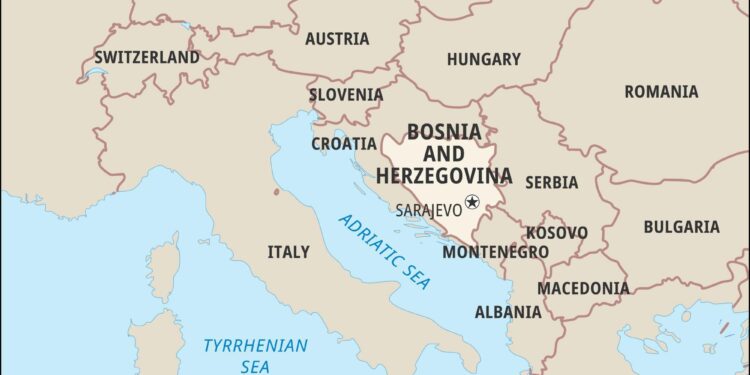Bosnia and Herzegovina’s bid to join the European Union has reignited debates over the country’s political stability, economic potential, and the broader geopolitical implications for the Balkans. As Brussels closely monitors reforms and progress, questions arise about whether the Western Balkans’ most ethnically divided state can meet the EU’s stringent criteria-and if its accession would ultimately strengthen the Union or complicate an already complex regional landscape. This article examines the challenges and stakes of Bosnia and Herzegovina’s EU membership ambitions within the evolving foreign policy framework.
Bosnia and Herzegovina’s EU Ambitions Examined Through Political and Economic Challenges
Bosnia and Herzegovina’s path to European Union membership is fraught with intricate political obstacles that test the nation’s cohesion as well as the EU’s enlargement policy. The highly decentralized government system, instituted by the Dayton Accords, continues to obstruct unified decision-making. Ethno-political divisions remain deeply entrenched, impeding crucial reforms in judicial independence and anti-corruption measures. Moreover, the ruling parties frequently leverage nationalistic rhetoric, managing fragile political coalitions that complicate compliance with EU accession criteria. This environment generates a complex legitimacy crisis, where external pressure from Brussels meets internal resistance fueled by fears of loss of sovereignty and identity among constituent peoples.
On the economic front, Bosnia and Herzegovina has made strides but still battles significant structural challenges that put its EU ambitions at risk. The economy is characterized by weak competitiveness, high unemployment-especially among youth-and underdeveloped infrastructure. Foreign direct investment remains inconsistent, hindered by bureaucratic red tape and a lack of transparent regulations. However, some sectors, such as tourism, energy, and agriculture, present growth potential if properly nurtured. The table below summarizes key economic indicators relevant to accession readiness:
| Indicator | Current Status | EU Average | |||||||||||||||||||||||||||||||||||||||||
|---|---|---|---|---|---|---|---|---|---|---|---|---|---|---|---|---|---|---|---|---|---|---|---|---|---|---|---|---|---|---|---|---|---|---|---|---|---|---|---|---|---|---|---|
| Unemployment Rate | 17.3% | 6.5% | |||||||||||||||||||||||||||||||||||||||||
| GDP Growth (Annual) | 3.2% | 2.0% | |||||||||||||||||||||||||||||||||||||||||
FDI Inflows (per capita)
Summary:
If you would like, I can also assist with further analysis or Assessing the Impact of EU Integration on Regional Stability and Reform ProgressSince Bosnia and Herzegovina’s initial steps toward EU integration, the region has experienced both cautious optimism and persistent challenges. The promise of aligning with European standards has acted as a catalyst for significant reform efforts, particularly in governance, judicial independence, and economic transparency. These reforms are critical in addressing entrenched ethnic divisions and in fostering a more cohesive national identity. However, progress remains uneven, impeded by political fragmentation and sporadic nationalist backlashes, which continue to test the resilience of regional stability. Key factors shaping the integration impact include:
The ongoing EU integration process serves not only as a reform agenda but also as a stabilizing framework that nudges Bosnia and Herzegovina towards closer cooperation with its neighbors. While setbacks are common, the external pressure and incentives provided by the EU have been instrumental in pushing political actors to engage in dialogue and compromise, which is vital for long-term peace and reform continuity. The question remains: whether the institutional and societal adjustments fostered through this process can surmount deep-rooted divisions to secure a sustainable future both within Bosnia and across the Western Balkans. Strategic Recommendations for Advancing Bosnia and Herzegovina’s European Union ProspectsTo fortify Bosnia and Herzegovina’s pathway toward the European Union, a multifaceted strategy is essential. Prioritizing comprehensive judicial reforms will enhance the rule of law and public trust, addressing concerns over corruption and governance inefficiencies. Additionally, fostering greater political cohesion among the country’s diverse ethnic groups is critical to presenting a united front in EU negotiations. This can be achieved through enhanced dialogue mechanisms and institutional adjustments that promote inclusivity without compromising sovereignty. Economic modernization remains another cornerstone. Accelerating structural reforms to improve the business climate can attract foreign investment, thereby stimulating growth and employment. Key strategic actions include:
To ConcludeAs Bosnia and Herzegovina continues to navigate the complex path toward European Union membership, the debate over the merits and challenges of its bid remains central to both domestic and international discourse. While the prospect of EU integration promises economic development, political stability, and improved governance, persistent internal divisions and structural hurdles raise questions about the feasibility and timing of accession. Ultimately, whether Bosnia and Herzegovina’s EU bid is worth pursuing hinges not only on Brussels’ demands but also on the country’s capacity to unify its diverse political landscape and meet the EU’s stringent criteria. For policymakers and observers alike, the evolving situation merits close attention as the Western Balkans’ future unfolds. ADVERTISEMENT |















